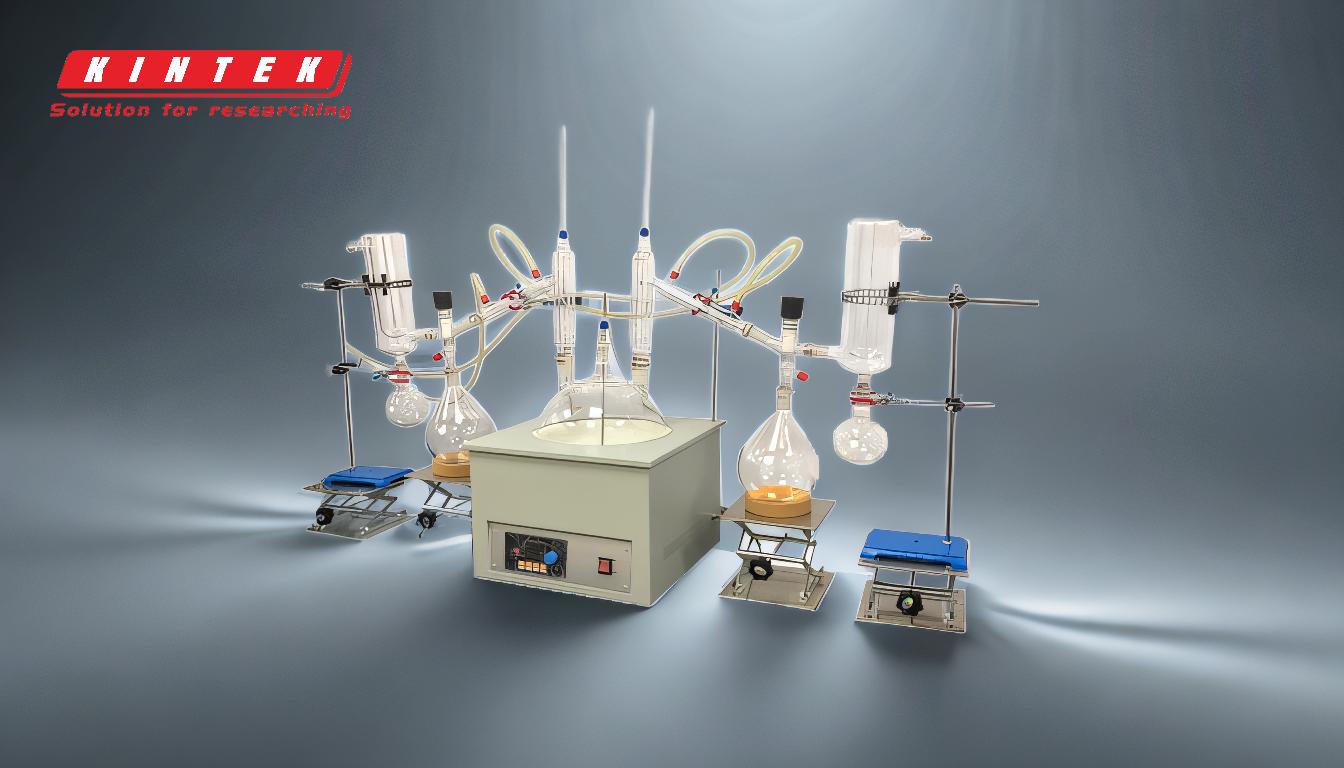Molecular distillation is a specialized separation process used in various industries to handle heat-sensitive, high-boiling-point, and easily oxidized materials. It is particularly valuable in the food, pharmaceutical, and chemical industries for purifying and concentrating substances without compromising their integrity. Applications include the production of high-quality edible oils, natural flavors, and fragrances; purification of drugs and pharmaceutical intermediates; and separation of complex compounds like vitamins, fatty acids, and polymer resins. Additionally, it plays a role in optimizing traditional production methods, reducing thermal damage, and improving product quality. Its ability to preserve natural properties and eliminate the need for chemical treatments makes it indispensable in industries requiring high-purity products.
Key Points Explained:

-
Applications in the Food Industry:
- Edible Oils: Molecular distillation is used to produce high-quality edible oils such as olive oil, soybean oil, and fish oil. It removes impurities and enhances the purity and stability of the oils.
- Natural Flavors and Fragrances: The process extracts natural flavors and fragrances from plant materials, preserving their delicate aromatic compounds.
- Functional Oils: It is employed to purify functional oils like γ-linolenic acid (GLA) and recover tocopherols from soybean oil deodorizer distillate (DDSO).
-
Applications in the Pharmaceutical Industry:
- Drug Purification: Molecular distillation is used to purify antibiotics, steroids, and other drugs, ensuring high purity and removing harmful impurities.
- Natural Health Products: It is applied to extract and purify natural health products like vitamin E, antioxidants, and lecithin, maintaining their bioactivity and efficacy.
- Traditional Chinese Medicine: The technology is integral to modernizing traditional Chinese medicine by purifying active ingredients and improving product quality.
-
Applications in the Chemical Industry:
- High-Boiling-Point Solvents: It is used to purify solvents like glycols and polyols, which are essential in various chemical processes.
- Polymer Resins: Molecular distillation removes impurities from polymer resins, enhancing their performance in plastic manufacturing.
- Organic Intermediates: The process is applied to purify organic intermediates, antioxidants, and plasticizers, ensuring high-quality chemical products.
-
Separation of Heat-Sensitive and Easily Oxidized Materials:
- Fatty Acids and Paraffins: Molecular distillation separates and purifies fatty acids, natural paraffins, and synthetic paraffin products.
- Monoglycerides and Silicone Oils: It is used to produce high-concentration monoglycerides and purify special silicone oils.
- Natural Extracts: The process separates solvents from natural extracts, preserving their bioactive properties.
-
Optimization of Traditional Production Methods:
- Cleaner Production: Molecular distillation reduces thermal damage and improves traditional technologies, leading to cleaner and more sustainable production processes.
- Product Quality Enhancement: It optimizes synthesis processes, improving the quality and consistency of end products.
-
Industrial Applications Beyond Food, Pharma, and Chemicals:
- Petrochemical Industry: Molecular distillation separates hydrocarbons and purifies organic intermediates in the petrochemical sector.
- Fine Chemicals: It is used in the fine chemical industry to purify alkylpolyglucosides, carotene, and other high-value compounds.
- Plastics Industry: The process refines emulsifiers and plasticizers, enhancing the performance of plastic products.
-
Advantages of Molecular Distillation:
- Preservation of Natural Properties: The process eliminates the need for chemical treatments, preserving the natural properties of materials.
- High Purity: It achieves high-purity separation, making it ideal for industries requiring stringent quality standards.
- Versatility: Molecular distillation is adaptable to a wide range of materials and industries, from food and pharmaceuticals to petrochemicals and plastics.
In summary, molecular distillation is a versatile and indispensable technology across multiple industries, enabling the purification, concentration, and optimization of heat-sensitive and high-value materials while maintaining their integrity and quality.
Summary Table:
| Industry | Applications |
|---|---|
| Food | Edible oils, natural flavors, functional oils |
| Pharmaceutical | Drug purification, natural health products, traditional Chinese medicine |
| Chemical | High-boiling-point solvents, polymer resins, organic intermediates |
| Petrochemical | Hydrocarbon separation, organic intermediate purification |
| Plastics | Emulsifiers, plasticizers, polymer resin refinement |
| Advantages | Preservation of natural properties, high purity, versatility |
Discover how molecular distillation can optimize your processes—contact us today for expert guidance!










